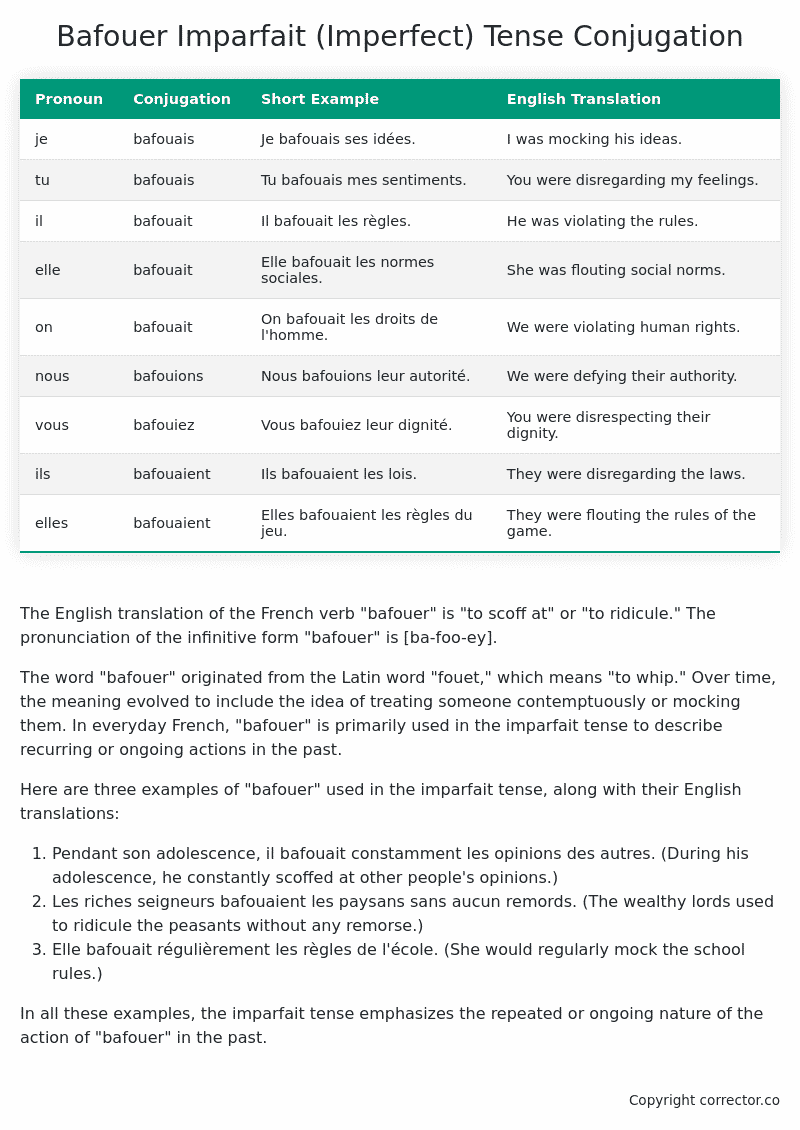Imparfait (Imperfect) Tense Conjugation of the French Verb bafouer
Introduction to the verb bafouer
The English translation of the French verb “bafouer” is “to scoff at” or “to ridicule.” The pronunciation of the infinitive form “bafouer” is [ba-foo-ey].
The word “bafouer” originated from the Latin word “fouet,” which means “to whip.” Over time, the meaning evolved to include the idea of treating someone contemptuously or mocking them. In everyday French, “bafouer” is primarily used in the imparfait tense to describe recurring or ongoing actions in the past.
Here are three examples of “bafouer” used in the imparfait tense, along with their English translations:
- Pendant son adolescence, il bafouait constamment les opinions des autres.
(During his adolescence, he constantly scoffed at other people’s opinions.) - Les riches seigneurs bafouaient les paysans sans aucun remords.
(The wealthy lords used to ridicule the peasants without any remorse.) - Elle bafouait régulièrement les règles de l’école.
(She would regularly mock the school rules.)
In all these examples, the imparfait tense emphasizes the repeated or ongoing nature of the action of “bafouer” in the past.
Table of the Imparfait (Imperfect) Tense Conjugation of bafouer
| Pronoun | Conjugation | Short Example | English Translation |
|---|---|---|---|
| je | bafouais | Je bafouais ses idées. | I was mocking his ideas. |
| tu | bafouais | Tu bafouais mes sentiments. | You were disregarding my feelings. |
| il | bafouait | Il bafouait les règles. | He was violating the rules. |
| elle | bafouait | Elle bafouait les normes sociales. | She was flouting social norms. |
| on | bafouait | On bafouait les droits de l’homme. | We were violating human rights. |
| nous | bafouions | Nous bafouions leur autorité. | We were defying their authority. |
| vous | bafouiez | Vous bafouiez leur dignité. | You were disrespecting their dignity. |
| ils | bafouaient | Ils bafouaient les lois. | They were disregarding the laws. |
| elles | bafouaient | Elles bafouaient les règles du jeu. | They were flouting the rules of the game. |
Other Conjugations for Bafouer.
Le Present (Present Tense) Conjugation of the French Verb bafouer
Imparfait (Imperfect) Tense Conjugation of the French Verb bafouer (You’re reading it right now!)
Passé Simple (Simple Past) Tense Conjugation of the French Verb bafouer
Passé Composé (Present Perfect) Tense Conjugation of the French Verb bafouer
Futur Simple (Simple Future) Tense Conjugation of the French Verb bafouer
Futur Proche (Near Future) Tense Conjugation of the French Verb bafouer
Plus-que-parfait (Pluperfect) Tense Conjugation of the French Verb bafouer
Passé Antérieur (Past Anterior) Tense Conjugation of the French Verb bafouer
Futur Antérieur (Future Anterior) Tense Conjugation of the French Verb bafouer
Subjonctif Présent (Subjunctive Present) Tense Conjugation of the French Verb bafouer
Subjonctif Passé (Subjunctive Past) Tense Conjugation of the French Verb bafouer
Subjonctif Imparfait (Subjunctive Imperfect) Tense Conjugation of the French Verb bafouer
Subjonctif Plus-que-parfait (Subjunctive Pluperfect) Tense Conjugation of the French Verb bafouer
Conditionnel Présent (Conditional Present) Tense Conjugation of the French Verb bafouer
Conditionnel Passé (Conditional Past) Tense Conjugation of the French Verb bafouer
Conditionnel Passé II (Conditional Past II) Tense Conjugation of the French Verb bafouer
L’impératif Présent (Imperative Present) Tense Conjugation of the French Verb bafouer
L’impératif Passé (Imperative Past) Tense Conjugation of the French Verb bafouer
L’infinitif Présent (Infinitive Present) Tense Conjugation of the French Verb bafouer
L’infinitif Passé (Infinitive Past) Tense Conjugation of the French Verb bafouer
Le Participe Présent (Present Participle) Tense Conjugation of the French Verb bafouer
Le Participe Passé (Past Participle) Tense Conjugation of the French Verb bafouer
Struggling with French verbs or the language in general? Why not use our free French Grammar Checker – no registration required!
Get a FREE Download Study Sheet of this Conjugation 🔥
Simply right click the image below, click “save image” and get your free reference for the bafouer imparfait tense conjugation!

Bafouer – About the French Imparfait Tense
NOTE: To take a deep dive into all the French tenses then see our article on Mastering French Tense Conjugation.
Formation of the Imparfait Tense
For regular -er verbs:
For regular -ir verbs
For regular -re verbs
Common Everyday Usage Patterns
Description of Past Habits
Background Information
Mental and Emotional States
It’s employed to express emotions, thoughts, or physical sensations in the past. For example: “J’étais content quand il est arrivé.” (I was happy when he arrived.)
Ongoing Actions
Points to Note About the Imparfait Tense
Passé Composé vs. Imparfait
Conditional
Si Clauses
Narration
I hope you enjoyed this article on the verb bafouer. Still in a learning mood? Check out another TOTALLY random French verb imparfait conjugation!


